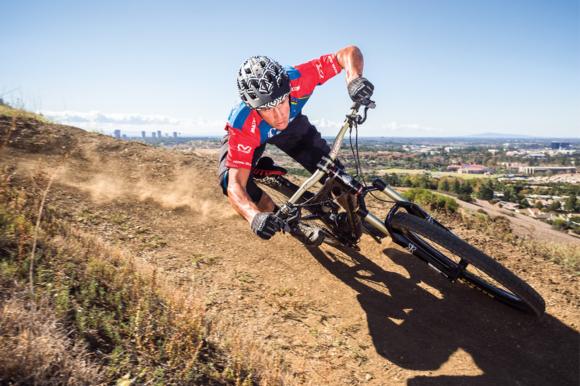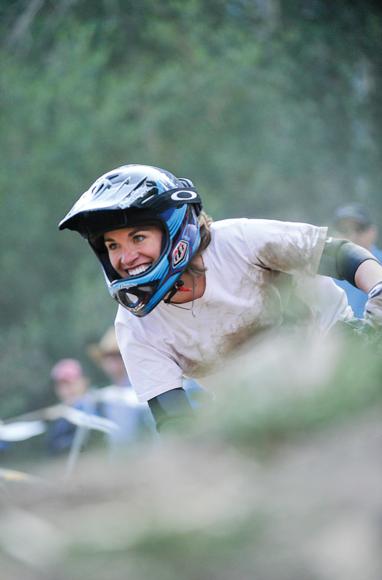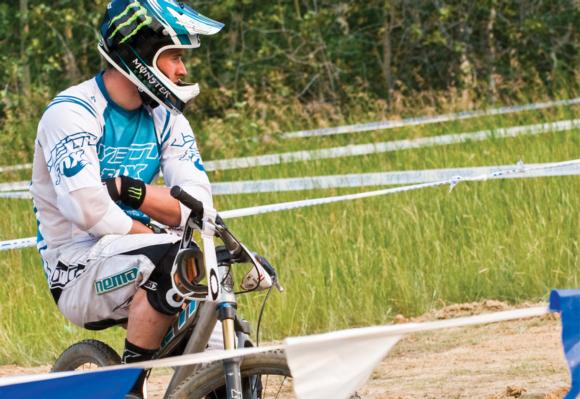Learn the mental and emotional skills needed to win
This is an excerpt from Mastering Mountain Bike Skills 3rd Edition by Brian Lopes,Lee McCormack.

There is a 0.1 percent chance you might beat Brian physically, but there's a 0.00001 percent chance you'll beat him mentally. That's why he has done so much winning over so many decades.
In any competitive class, a handful of people have the physical strength and skills to win. To win, you need the emotional and mental skills to hold it together throughout the race. Here are some tips to make you as stony as a statue.
Race for the Right Reasons
Competition can stoke youand inspire you to new greatness, or it can bum you out and spoil you on riding. The determining factor isn't whether you win or lose the race; it's how you perform in relation to your expectations and goals.
We enter races for a myriad of reasons: to wield our powers against others; to see how we stand against the best; to make a living; to challenge ourselves; to ride as fast as we want on fun courses; to travel to cool places; to bash elbows with our buddies; to commune with the racing tribe; to validate the time, money, and energy we put into our sport; and for some of us, to validate ourselves as riders.
Before you reach the starting line, take the time to figure out what, exactly, you expect to get from the experience. By setting clear expectations, you'll know what to strive for, and you'll know how to measure your success. Here are some things to keep in mind:
Why is more powerful than what. Think about the reasons you race. Whether you race for self-improvement (good reason) or to destroy other people (not such a good reason), your fundamental goal will drive you through the inevitable difficulties - and successes.
Enjoy the process. Riding (and living) is a never-ending process of increasing your strength and your skills. When you become serious about racing, you dedicate yourself to the process of finishing higher and higher in more challenging events and, eventually, in higher classes. Just as learning to jump a 10-foot (3 m) double is a step on the way to jumping a 12-footer (3.7 m), then a 15-footer (4.6 m), and on and on until the requirements outweigh the rewards, earning eighty-seventh place is a step toward tenth place, then third, then first, and then up to a harder class. Write down your racing goals and keep track of your progress. When you feel defeated or question your motives, your racing log will keep you motivated. Remember: Keep striving to improve, but enjoy where you are and take the time to appreciate what you've already accomplished.
Remember: It's only bike racing. What? Blasphemy! After you strip away your ego, winning a race means only this: You were the fastest or first rider on that day, in those conditions, among that specific group of racers. Lee won a Pump Track World Championshipwhen Brian wasn't there. That doesn't mean much.
Anything - different terrain, weather, racers, or luck - could have dropped you to number 2. Shoot, if you were in a higher class, you might have beeneighty-seventh! In racing (and in life) you can control only yourself - and then sometimes only barely. Try not to worry about things that are outside your control. If someone flats and you move up a spot, don't be too proud of yourself. In the same way, if a competitor makes a clever move and you fall a spot, don't be too bummed.
If you believe the old No Fear T-shirt that said "Second place is the first loser," you are in for a world of pain.
Have reasonable expectations. The most reasonable expectation is "I will do my best," whatever that means to you. For most people (except Brian), the most unreasonable expectation is "I will win." If you expect to win all the time, expect to be disappointed much of the time. In a time-trial event, you have no influence on other people's runs. If they are fitter, better skilled, cleverer, or ride in faster conditions, they might beat you. Do everything you can to ensure a good time, but in the end realize that times are what they are: just times. Racing head-to-head is even more complicated. You can get beaten because of a crash, a clever pass, superior fitness, or mental toughness. Win or no win - either way, do your best.
Set personal performance goals. As we've been saying, winning is arbitrary and, in large part, out of your control. Set goals for yourself: In a downhill, lay off your brakes through the tricky rock section; in a cross-country, maintain 176 beats per minute on the climbs; in an enduro, pace yourself to finish the entire weekend strong. Whether you win or not, judge yourself by how well you met your goals. But keep in mind that this is racing. Keep striving to do better. Otherwise, go for a fun ride and save the entry fee.
Pick the right class. Racing is a great opportunity to compare yourself with other riders of the same caliber. The best racing class for you depends on your reasons for racing. If you want a challenge, race in a class that lets you ride fun courses with riders who will push you. For the most intense competition, race in a class that you have a chance, but no guarantee, of winning. There's nothing as exciting as battling it out with close competitors. Losing makes you hungry, and winning is definitely something to be proud of. If you must destroy other people to feel good about yourself, go ahead and stay in an easy class. Enjoy your five overall titles in Beginner 30-34; then move on to destroy Beginner 35-39. But be warned: There is a special hell for sandbaggers, and your competitors will try to send you there.
Use your losses.Learn from your mistakes. In a way, second place is more exciting than first place. When you win, you feel good and there are no excuses, but you start wondering about where to go from there. When you take a close second (or third or eighty-seventh or whatever), you get really hungry and hypermotivated to do better next time. The drive toward improvement is much more powerful than the satisfaction of accomplishment.

Have fun! Bobbi Watt, post-crash, filthy and stoked to be riding.
Get Into the Racing Zone

Before their race, some riders get excited and talkative. Others get quiet and reflective. Downhill, slalom, 4x, BMX, and enduro legend Jared Graves does the latter.
You've heard all types of competitors talk about getting into the zone. The zone is like the state of flow (see Find a State of Flow in chapter 13),only it's more intense. You've blocked out everything but what you need to win the race. There are good riders - people who flow smoothly while they're out playing with their buddies, but who crumble under pressure - and there are good racers - those who can reach the zone and drop the hammer on command. Brian is one of the best ever. Here are some tips to help you reach the racing zone.
Visualize. This is the key to a great performance. Imagine yourself having a great race. Fill in as much detail as you can - sights, sounds, sensations. Run your race in real time. Imagine what you'll do if you get off line or get passed. If you imagine something in enough detail, it's as if your brain is practicing in real life.
Before the start of the 1993 Mammoth Kamikaze, Missy Giove sat by herself on a rock outcropping, pedaling with her hands and leaning into each corner, imagining every detail of the race course. The phrase "If you can see it, you can be it" is usually true. The phrase "If you can't see it, you can't be it" is always true.
Learn more about Mastering Mountain Bike Skills, Third Edition.
More Excerpts From Mastering Mountain Bike Skills 3rd EditionSHOP

Get the latest insights with regular newsletters, plus periodic product information and special insider offers.
JOIN NOW
Latest Posts
- Sample mental health lesson plan of a skills-based approach
- Sample assessment worksheet for the skill of accessing valid and reliable resources
- Help your students overcome what holds them back from making health-promoting choices
- Example of an off-season microcycle
- Modifying lifts
- Screening for multilevel programs in a team environment


